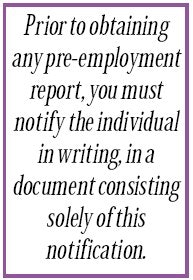Use Background Checks Carefully

You face even greater risks because of the growing menace of workplace violence. Fail to check the background of a new employee who ends up attacking fellow workers or customers, and you'll end up on the losing side of a costly negligent-hiring lawsuit.
"Negligent hiring is an attractive theory for attorneys looking to make money from your business," cautions Daniel Cohen, a labor and employment-law attorney with the Farmington Hills, Mich., firm of Charfoos, Reiter, Peterson, Holmquist and Pilchak. "You can be sued if there was something in a new hire's background that created a risk to your workplace, and you did not bother to try to find out that information."
All of this raises a practical question. Just how do you get valuable background information? If you've placed many calls to check references, you know that former employers are usually reluctant to disclose anything beyond dates of employment. That's because they fear their departed employees will sue them for making damaging, inaccurate statements, under a legal theory called "negligent referral."
To the rescue comes the World Wide Web, which lists a growing number of on-line employee-screening services. These include:
• www.informus.com. Information includes credit and criminal records, driving reports, workers' compensation records, employment history, address verification, professional licenses, education and personal references. Prices range from $10 to $30.
• www.knowx.com. This company, which advertises itself as "a courthouse on the web," gets its information from publicly available legal records. Information includes liens, lawsuits, judgments, bankruptcies, assets and residential addresses. Records cost from $5 to $25.
• www.data-trac.com. Information includes address histories, motor vehicle records, real property searches and more. Prospective users must register and provide professional credentials of status as corporate human resource departments. Search fees may be as low as $10 with extra charges for more detailed reports.
• www.advsearch.com. This is more of a special-order service, in which you fill out a form and are billed for work accomplished. Information includes criminal convictions, address histories, bankruptcies, workers' compensation records, credit reports and more.
(For a list of other employee screening services, search for "background verification" on Yahoo.)
Used correctly, these inexpensive services can save you from hiring individuals with bogus résumés or dangerous backgrounds. The fact that you engaged in background checking can be a good defense against charges of negligent hiring. But watch out: Used improperly, these services can lead to costly lawsuits for violation of federal law, employment discrimination or invasion of privacy.
"Generally speaking, one has the right to access and rely on information obtained in background checks," says Michael G. Cleveland, an employment law attorney with Chicago-based Vedder Price Kaufman & Kammholz. "But there are risks that lurk out there for the uninitiated. Some information is protected by law, and in some cases use of information can result in unlawful discriminatory decision-making."
The secret to walking the fine line between prudent investigation and illegal intrusion is to know what the law requires. Keep in mind the following three caveats:
1. DON'T VIOLATE THE FAIR CREDIT REPORTING ACT. When gathering information about a prospective employee, the number-one risk is falling afoul of the FCRA, which was amended in September 1997 to require disclosure of all background checks to individuals applying for work.
"The FCRA is a major issue that a lot of employers don't know about," says Kevin Prendergast, general counsel at Research Associates Inc., a pre-employment background checking firm in Cleveland. "If you run a background check, you must comply with this law."
Here are key points from the law: • Prior to obtaining any pre-employment report, you must notify the prospective employee in writing, in a document consisting solely of this notification. Also, get the person's written authorization before you retrieve the report.
• If you rely only partly on the report for an adverse job action (meaning that you don't intend to hire the applicant), you must give the individual a "preadverse action disclosure" that includes a copy of the report, along with a copy of "A Summary of Your Rights Under the Fair Credit Reporting Act," which you can get from the Federal Trade Commission. The person must be given time to respond.
• After you have taken the adverse action you must give the person an "adverse action notice."
These FCRA notification requirements kick in whenever you obtain information about a job candidate from third parties. These include Web-based employee-screening services. And the FCRA stipulations must be met even with seemingly minor background checks, such as scanning public records for driving violations or past residential addresses. Failure to produce the proper documents subjects you to costly penalties, as well as possible lawsuits by the affected prospective employees.
For more guidance on how to stay out of hot water, refer to "What Employers Need to Know," an excellent document posted by the FTC at www.ftc.gov/bcp/ conline/pubs/buspubs/credempl.htm.
Once you understand what the FCRA requires, fulfilling its mandate is straightforward. "The FCRA requirements are not much of a problem in the application process," says Cohen. "After all, the prospect who refuses to authorize the report can be invited to apply to another employer."
2. BEWARE EMPLOYMENT DISCRIMINATION. It all sounds so easy. You run background checks on your computer, discover which of your job applicants lack clean slates, and toss their employment applications in the wastebasket.
Not so fast. You've already seen how you can easily violate the FCRA. But there's another way you can find yourself on the losing end of a crippling lawsuit or government action. Many states have laws that prohibit use of specific records in making employment decisions. New York, for example, limits an employer's ability to make decisions on incarceration records. And in Michigan, you may not access or rely on criminal arrests that did not result in convictions. (Notice the first part of that statement: even looking at arrest records is considered discriminatory.)
"You need to understand that the law varies by state," says Cohen. "You have to find out what your state allows prior to reviewing records." Indeed, one of the drawbacks of Web-based employee-screening services is their national scope. Some of their information may be legally accessed in some states, but not in others.
Because certain minority groups are subject to more arrests and convictions than other groups, some courts have ruled that basing employment decisions on such records is discriminatory. It's less risky to rely on actual conviction records than arrest records. But even then, using such records carries peril. "Some opinions from the Equal Employment Opportunity Commission state that since some minority groups have been convicted more often of crimes, having a policy of disqualifying people with criminal backgrounds is racially discriminatory," says Cleveland. The courts don't always rule that way, he adds, but you are taking a chance if you go too far.
The solution, Cleveland says, is to tie your hiring criteria to the requirements of the job. "If you say, 'I won't hire anyone with a criminal conviction, no matter what its nature,' you are being too aggressive," he says. "I think it's wiser to ask this question: 'What does the criminal conviction have to do with the particular job that is involved?' "
Suppose you are hiring someone for a position involving money handling. If the individual was convicted of theft, that criminal record would be relevant. "On the other hand, would conviction for driving under the influence be a pertinent consideration?" Cleveland asks. "Maybe not. To successfully defend against a discrimination charge, go beyond compliance with the letter of the law. Make sure you are able to defend your decision on a rational basis."
3. AVOID LAWSUITS FOR INVASION OF PRIVACY. Once you obtain the information you need, keep it under lock and key. If details are shared with the wrong people, and the workplace gossip mill starts grinding, the investigated individual can sue for invasion of privacy. "Don't disclose why you did not hire someone to people who do not have a need to know," says Cleveland. "You may also run the risk of a defamation suit."
Despite the risks involved, conducting background checks is essential. Today's business climate is characterized by a fluid movement of workers from one employer to another. "One bad apple can poison a company," warns Prendergast. "You can't afford not to check the backgrounds of people you hire."
































